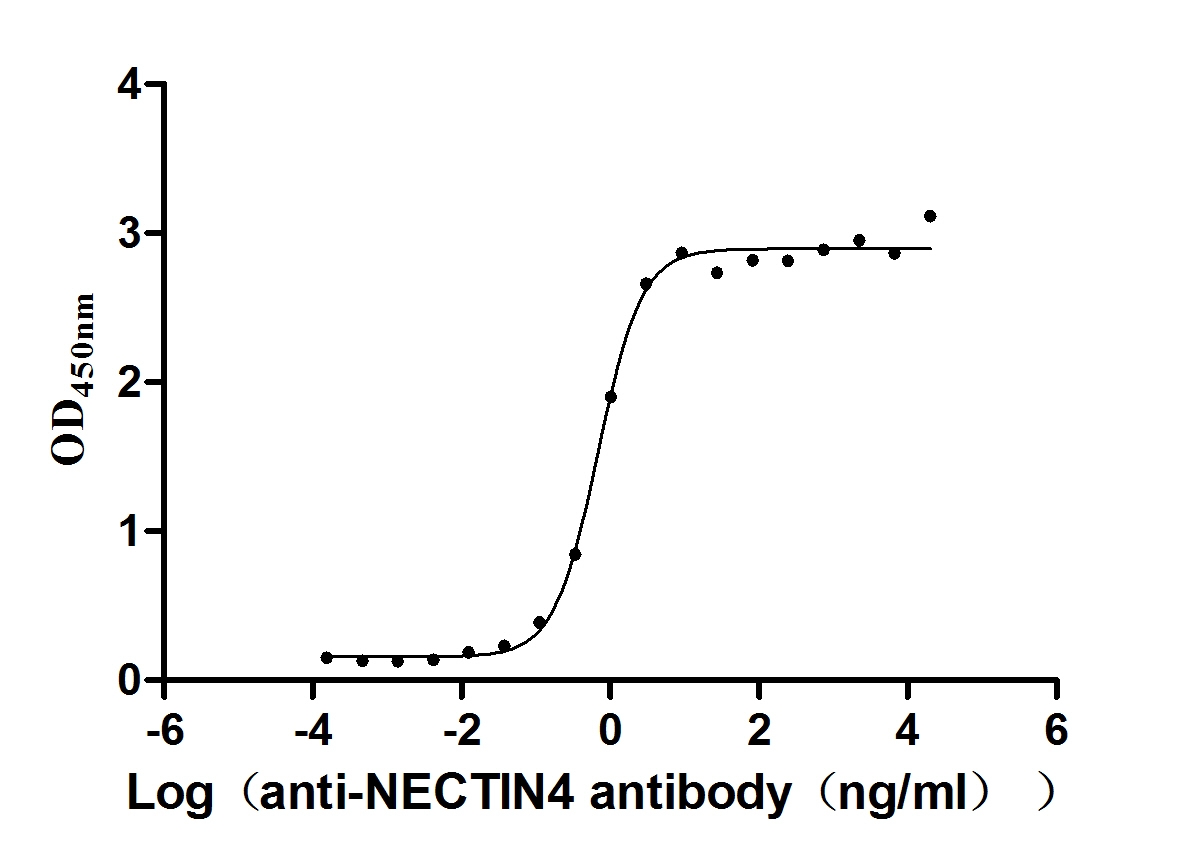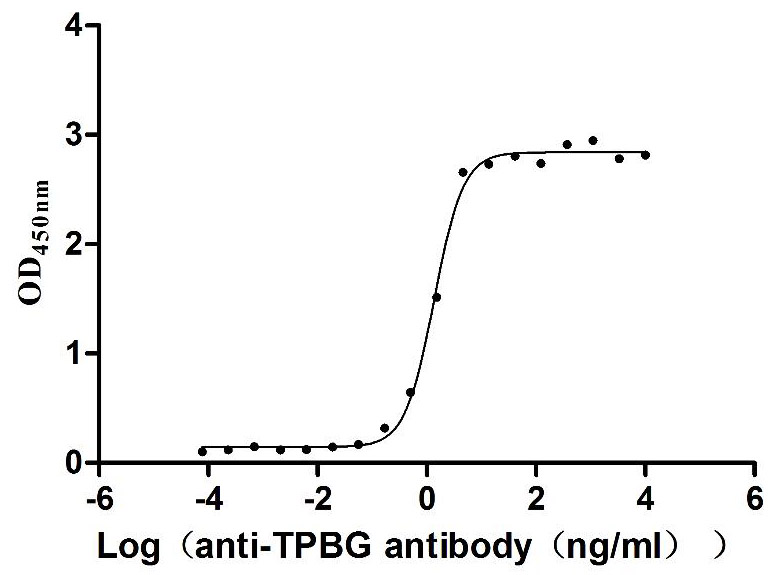Recombinant Mouse Serine/threonine-protein kinase WNK1 (Wnk1), partial
-
中文名稱:小鼠Wnk1重組蛋白
-
貨號:CSB-YP026124MO
-
規(guī)格:
-
來源:Yeast
-
其他:
-
中文名稱:小鼠Wnk1重組蛋白
-
貨號:CSB-EP026124MO
-
規(guī)格:
-
來源:E.coli
-
其他:
-
中文名稱:小鼠Wnk1重組蛋白
-
貨號:CSB-EP026124MO-B
-
規(guī)格:
-
來源:E.coli
-
共軛:Avi-tag Biotinylated
E. coli biotin ligase (BirA) is highly specific in covalently attaching biotin to the 15 amino acid AviTag peptide. This recombinant protein was biotinylated in vivo by AviTag-BirA technology, which method is BriA catalyzes amide linkage between the biotin and the specific lysine of the AviTag.
-
其他:
-
中文名稱:小鼠Wnk1重組蛋白
-
貨號:CSB-BP026124MO
-
規(guī)格:
-
來源:Baculovirus
-
其他:
-
中文名稱:小鼠Wnk1重組蛋白
-
貨號:CSB-MP026124MO
-
規(guī)格:
-
來源:Mammalian cell
-
其他:
產(chǎn)品詳情
-
純度:>85% (SDS-PAGE)
-
基因名:Wnk1
-
Uniprot No.:
-
別名:Wnk1; Hsn2; Prkwnk1Serine/threonine-protein kinase WNK1; EC 2.7.11.1; Protein kinase lysine-deficient 1; Protein kinase with no lysine 1
-
種屬:Mus musculus (Mouse)
-
蛋白長度:Partial
-
蛋白標(biāo)簽:Tag?type?will?be?determined?during?the?manufacturing?process.
The tag type will be determined during production process. If you have specified tag type, please tell us and we will develop the specified tag preferentially. -
產(chǎn)品提供形式:Lyophilized powder
Note: We will preferentially ship the format that we have in stock, however, if you have any special requirement for the format, please remark your requirement when placing the order, we will prepare according to your demand. -
復(fù)溶:We recommend that this vial be briefly centrifuged prior to opening to bring the contents to the bottom. Please reconstitute protein in deionized sterile water to a concentration of 0.1-1.0 mg/mL.We recommend to add 5-50% of glycerol (final concentration) and aliquot for long-term storage at -20℃/-80℃. Our default final concentration of glycerol is 50%. Customers could use it as reference.
-
儲存條件:Store at -20°C/-80°C upon receipt, aliquoting is necessary for mutiple use. Avoid repeated freeze-thaw cycles.
-
保質(zhì)期:The shelf life is related to many factors, storage state, buffer ingredients, storage temperature and the stability of the protein itself.
Generally, the shelf life of liquid form is 6 months at -20°C/-80°C. The shelf life of lyophilized form is 12 months at -20°C/-80°C. -
貨期:Delivery time may differ from different purchasing way or location, please kindly consult your local distributors for specific delivery time.Note: All of our proteins are default shipped with normal blue ice packs, if you request to ship with dry ice, please communicate with us in advance and extra fees will be charged.
-
注意事項:Repeated freezing and thawing is not recommended. Store working aliquots at 4°C for up to one week.
-
Datasheet :Please contact us to get it.
靶點(diǎn)詳情
-
功能:Serine/threonine kinase which plays an important role in the regulation of electrolyte homeostasis, cell signaling, survival, and proliferation. Acts as an activator and inhibitor of sodium-coupled chloride cotransporters and potassium-coupled chloride cotransporters respectively. Activates SCNN1A, SCNN1B, SCNN1D and SGK1. Controls sodium and chloride ion transport by inhibiting the activity of WNK4, by either phosphorylating the kinase or via an interaction between WNK4 and the autoinhibitory domain of WNK1. WNK4 regulates the activity of the thiazide-sensitive Na-Cl cotransporter, SLC12A3, by phosphorylation. WNK1 may also play a role in actin cytoskeletal reorganization. Phosphorylates NEDD4L. Acts as a scaffold to inhibit SLC4A4, SLC26A6 as well as CFTR activities and surface expression, recruits STK39 which mediates the inhibition.; Dominant-negative regulator of the longer isoform 1. Does not have kinase activity, does not directly inhibit WNK4 and has no direct effect on sodium and chloride ion transport. Downregulates sodium-chloride cotransporter activity indirectly by inhibiting isoform 1, it associates with isoform 1 and attenuates its kinase activity. In kidney, may play an important role regulating sodium and potassium balance.
-
基因功能參考文獻(xiàn):
- GABAAR-dependent regulation of KCC2 diffusion involves phosphorylation of its T906/T1007 residues by WNK1. PMID: 29176664
- The differential regulation of ROMK, large-conductance Ca(2+)-activated K(+) (BK) channel, BK-alpha and NKCC2 between female and male mice, at least, were partly mediated via WNK1 pathway, which may contribute to the sexual dimorphism of plasma K(+) and blood pressure control. PMID: 28237360
- this study identified the WNK1 kinase as a regulator of both integrin-mediated adhesion and T cell migration PMID: 27400149
- Akt3 constitutively suppresses macropinocytosis in macrophages through a novel WNK1/SGK1/Cdc42 pathway. PMID: 28389565
- Electrophysiological analysis showed that WNK1/HSN2 shifted the concentration of Cl(-)such that GABA signaling resulted in a less hyperpolarized state (increased neuronal activity) rather than a more hyperpolarized state (decreased neuronal activity) in mouse spinal nerves. PMID: 27025876
- A high-K(+) diet induced an increase in L-WNK1 expression selectively in intercalated cells and may contribute to enhanced BK channel expression and K(+) secretion in collecting ducts. PMID: 26662201
- these data provide insight into the mechanism regulating Cl(-) homeostasis in immature neurons, and suggest that WNK1-regulated changes in KCC2 phosphorylation contribute to the developmental excitatory-to-inhibitory GABA sequence. PMID: 26126716
- findings indicate that the proline-rich exons are modular cassettes that convert WNK1 into a NEDD4-2 substrate, thereby linking aldosterone and other NEDD4-2-suppressing antinatriuretic hormones to NCC phosphorylation status. PMID: 26241057
- enhances BK channel function by reducing ERK1/2 signaling-mediated lysosomal degradation of the channel PMID: 25145935
- study identifies a separation of functions for the WNK1-activated protein kinases OSR1 and SPAK in mediating proliferation, invasion, and gene expression in endothelial cells PMID: 25362046
- Results show that the expression profiles of Wnk1 isoforms change during the development, and that the expression of the Wnk1 splice variant containing the Hsn2 exon is prominent during developing and in adult mouse tissues. PMID: 23451271
- subset of integral membrane proteins, therefore, requires an early dislocation event to expose part of their luminal domain to the cytosol, before HRD1-mediated polyubiquitination and dislocation PMID: 23940364
- In Wnk1 knockout mice, levels of Lhx8 expression were reduced, inhibiting neural specification. PMID: 23383144
- WNK1 activation of the OSR1 signaling cascade is an essential pathway that regulates angiogenesis and cardiac formation during mouse embryo development. PMID: 23386621
- The findings supported the notion that WNK1 stimulates renal outer medullary potassium channel-mediated K+ secretion, but not flow-dependent K+ secretion mediated by maxi-K+ channels in cortical collecting ducts. PMID: 23195681
- The contribution of WNK1 to total WNK kinase activity in the kidney may be small, but that WNK1 may play a substantial role in the regulation of blood pressure in the arteries. PMID: 22294159
- The results evidenced a striking tissue-specific distribution of the different isoforms and the unexpected presence of exon HSN2 in many tissues other than the nervous system. PMID: 22701532
- Findings uncover a vascular signaling pathway linking alpha(1)-adrenergic receptors and pressure to WNK1, SPAK, and NKCC1 and may, thus, significantly broaden the comprehension of the regulatory mechanisms of vascular tone in arterial hypertension. PMID: 21768522
- WNK1 is a negative regulator of NCC and NKCC2 in vivo and plays an important role in the control of Na(+) homeostasis and blood pressure. PMID: 21131289
- Even though the increase in NCC activity in KS-WNK1(-/-) mice was less pronounced than in mice overexpressing a mutant form of WNK4, our study suggests that the activation of Na-Cl cotransporter is not sufficient to induce a hyperkalemic hypertension PMID: 20921400
- regulated by miR-192, target sequence present in the 3' untranslated region PMID: 20813867
- HSN2 is a nervous system-specific exon of the WNK1 gene (WNK1/HSN2 isoform). PMID: 18521183
- findings suggest that WNK1 plays a general role in the regulation of epithelial Cl(-) flux [WNK1] PMID: 12522152
- Several WNK1 transcript classes are demonstrated, showing tissue-, developmental-, and nephron-segment-specific expression. PMID: 14514722
- Wnk1 heterozygous mice displayed a significant decrease in blood pressure. PMID: 14610273
- WNK1 is a physiologically relevant target of insulin signaling through PI3K and Akt/PKB and functions as a negative regulator of insulin-stimulated mitogenesis PMID: 15799971
- the analysis of spatial and temporal aspects of WNK1 expression and regulation. PMID: 16816365
- These results demonstrate a novel function of WNK1 in proliferation, migration, and differentiation of neural progenitor cells, likely by mechanisms involving activation of the mitogen-activated protein (MAP) kinase ERK1/2 and/or ERK5 pathways. PMID: 17018027
- WNK1 is a dual modulator of TGFbeta-Smad signaling pathways PMID: 17392271
- KS-WNK1 is an important physiological regulator of renal K(+) excretion, likely through its effects on the ROMK1 channel. PMID: 19244242
- The kidney-specific WNK1 isoform suppresses thiazide-sensitive Na-Cl cotransport through the inhibition of full length WNK1 activity. PMID: 16204408
顯示更多
收起更多
-
亞細(xì)胞定位:Cytoplasm.
-
蛋白家族:Protein kinase superfamily, Ser/Thr protein kinase family, WNK subfamily
-
組織特異性:Widely expressed in both adult and embryonic tissue, with highest levels observed in the testis and lower levels in heart, lung, kidney, placenta, brain and skeletal muscle. Expressed in pancreatic duct. Two isoforms are expressed in heart, a single short
-
數(shù)據(jù)庫鏈接:
Most popular with customers
-
Recombinant Human Pro-neuregulin-1, membrane-bound isoform (NRG1), partial (Active)
Express system: Mammalian cell
Species: Homo sapiens (Human)
-
Recombinant Human Nectin-4 (NECTIN4), partial (Active)
Express system: Mammalian cell
Species: Homo sapiens (Human)
-
Recombinant Dog B-lymphocyte antigen CD20 (MS4A1)-VLPs (Active)
Express system: Mammalian cell
Species: Canis lupus familiaris (Dog) (Canis familiaris)
-
Recombinant Human Trophoblast glycoprotein (TPBG), partial (Active)
Express system: Mammalian cell
Species: Homo sapiens (Human)
-
Recombinant Human Tumor-associated calcium signal transducer 2 (TACSTD2), partial (Active)
Express system: Mammalian cell
Species: Homo sapiens (Human)
-
Recombinant Human CUB domain-containing protein 1 (CDCP1), partial (Active)
Express system: Mammalian cell
Species: Homo sapiens (Human)
-
Recombinant Rat Gastric inhibitory polypeptide receptor (Gipr), partial (Active)
Express system: Mammalian cell
Species: Rattus norvegicus (Rat)
-
Recombinant Human Serotransferrin(TF) (Active)
Express system: Mammalian cell
Species: Homo sapiens (Human)


-AC1.jpg)

















